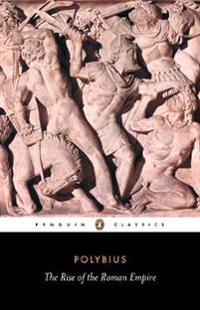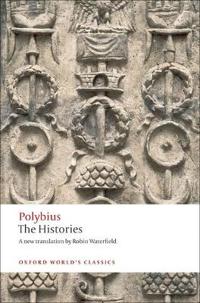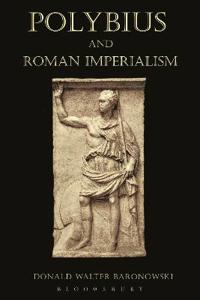The Rise of the Roman Empire (Storpocket)
avPolybius
ISBN: 9780140443622 - UTGIVEN: 197910The Greek statesman Polybius (c.200 - 118 BC) wrote his account of the relentless growth of the Roman Empire in order to help his fellow countrymen understand how their world came to be dominated by Rome. Opening with the Punic War in 264 BC, he vividly records the critical stages of Roman expansion[...]
Polybius' "Histories" (Häftad)
avBrian C. McGing
ISBN: 9780195310337 - UTGIVEN: 201004Polybius' Histories is one of classical antiquity's great political narratives. Written in 40 books (of which only the first five are preserved in full), it originally set out to explain the dramatic rise of Rome in the half century from the war against Hannibal to the defeat and abolishment of the [...]
The Histories (Häftad)
avPolybius
ISBN: 9780199534708 - UTGIVEN: 201011'no one else in our times has attempted to write a universal history' Polybius' ambitious goal was to describe how Rome conquered the Mediterranean world in less than fifty-three years. This great study of imperialism takes the reader back to Rome's first encounter with Carthage in 264 and forward t[...]
Polybius and His World (Inbunden)
ISBN: 9780199608409 - UTGIVEN: 201303From his first publication, Aratos of Sicyon (1933), to his death in 2008, F. W. Walbank established himself as one of the leading ancient historians of the last century. His many publications - not least his three-volume commentary on the Greek historian of Roman power, Polybius - transformed the s[...]
Polybius (Övrig)
avF. W. Walbank
ISBN: 9780520069817 - UTGIVEN: 1990-02-07As a young man, the historian Polybius was an active politician in the Achaean Confederacy of the second century B.C., and later, during his detention at Rome, became a close friend of some leading Roman families. His History is our most important source for the momentous half-century during which t[...]
Moral Vision in the Histories of Polybius (Övrig)
avArthur M. Eckstein
ISBN: 9780520085206 - UTGIVEN: 1995-02-01Arthur Eckstein's fresh and stimulating interpretation challenges the way Polybius' Histories have long been viewed. He argues that Polybius evaluates people and events as much from a moral viewpoint as from a pragmatic, utilitarian, or even "Machiavellian" one. Polybius particularly asks for "impro[...]
Cultural Politics in Polybius's Histories (Inbunden)
avCraige B. Champion
ISBN: 9780520237643 - UTGIVEN: 2004-08-17The Histories (Inbunden)
avPolybius, W. R. (TRN) Paton, frank W. (EDT) Walbank
ISBN: 9780674996373 - UTGIVEN: 2010-05The historian Polybius (ca. 200-118 BCE) was born into a leading family of Megalopolis in the Peloponnese (Morea) and served the Achaean League in arms and diplomacy for many years, favoring alliance with Rome. From 168 to 151 he was held hostage in Rome, where he became a friend of Lucius Aemilius [...]
The Histories (Inbunden)
avPolybius
ISBN: 9780674996601 - UTGIVEN: 201205The historian Polybius (ca. 200--118 bc) was born into a leading family of Megalopolis in the Peloponnese and served the Achaean League in arms and diplomacy for many years. From 168 to 151 he was held hostage in Rome, where he became a friend of Scipio Aemilianus, whose campaigns, including the des[...]
The Histories of Polybius
ISBN: 9781108050807 - UTGIVEN: 2012-08The Histories of Greek-born, Roman historian Polybius (c.200-118 BCE) are reissued here in two volumes. Undertaken by the classicist Evelyn Shuckburgh (1843-1906), this first complete English translation (utilising F. Hultsch's 1867-72 Greek text) was published in 1889. A tutor, and later librarian,[...]
Polybius and Roman Imperialism
ISBN: 9781472504500 - UTGIVEN: 2013-05Polybius and Roman Imperialism explores in depth the complexity of the Greek historian Polybius' views on the expansion of Roman power. Although he considered imperialism intrinsically noble, and both admired and supported Roman domination, Polybius also evinced detachment from the ruling power. Th[...]














